Good News in History, July 30
On this day 94 years ago, at the conclusion of the inaugural FIFA World Cup, La Celeste, or Uruguay, won the trophy. Rarely considered as favorites in the tournament’s editions these days, Uruguay was on a tear by the time the first World Cup kicked off in Montevideo, Uruguay’s capital. They had won the 1924 and 1928 Olympic football tournaments. Beating Argentina 2-1 in the ’28 Olympics, they beat their cross-border rivals again, 4-2, to win the World Cup. READ more… (1930)
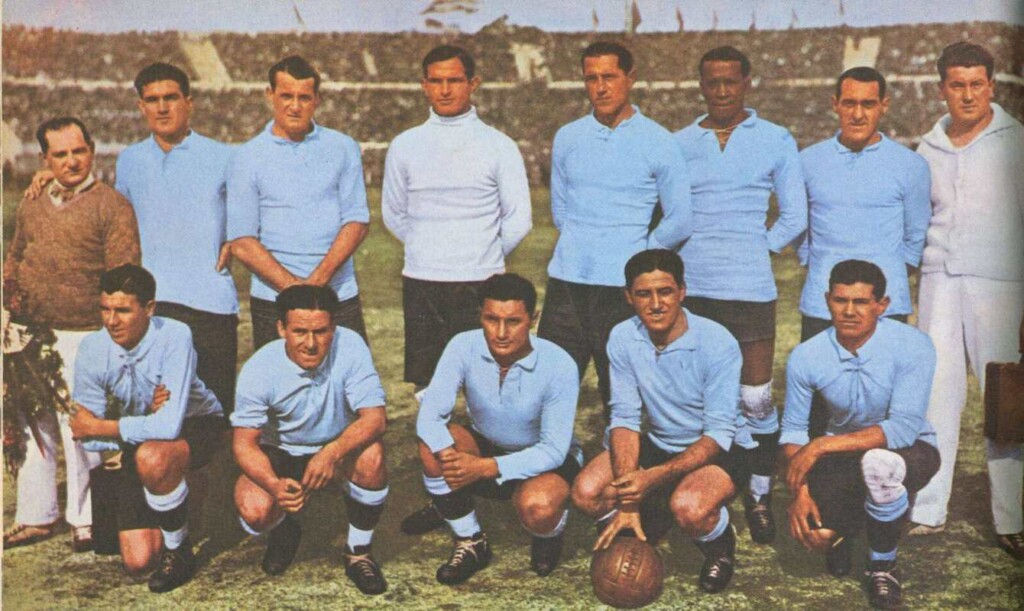
After their victory, Uruguay boycotted the following two editions of the tournament and didn’t return to the competition until 1950, but the twenty-year break and a changing of the generations hardly disrupted this early dominance. Against Brazil in the final, Uruguay claimed its second title. This feat became an integral part of Uruguay’s football identity and a source of inspiration for upcoming footballers with each passing generation.
Apart from 1942 and 1946, the FIFA World Cup has been organized every year, with the original editions supposed to be alternated between South American and European hosts. This was quickly reneged upon, leading to Uruguay’s two successive boycotts of the tournament in 1934 and 1938.
As of the 2022 FIFA World Cup, 22 final tournaments have been held since the event’s inception in 1930, and a total of 80 national teams have competed. The trophy has been won by eight national teams. With five wins, Brazil is the only team to have played in every tournament. The other World Cup winners are Germany and Italy, with four titles each; Argentina, with three titles; France, and Uruguay, each with two titles; and England and Spain, with one title each.
The viewership of the 2018 World Cup was estimated to be 3.57 billion, close to half of the global population. By 2016, the tournament had expanded to include 48 teams under the pretense of allowing the largest majority of global footballing diversity to be represented. At the time arguments existed that this would water down the matches and lower the quality of the tournament. In 2022 however, three African and three Asian teams all made it out of the group stage, with South Korea reaching the quarter-finals, and Morocco, incredibly, reaching the semi-finals.
MORE Good News on this Day:
- The French national anthem, “La Marseillaise” by Claude Joseph Rouget de Lisle, was first sung in Paris (1792)
- Foreign ministers from Greece, Turkey, and the UK signed a Cyprus Peace Agreement and Cease Fire to end weeks of shelling on the Mediterranean island (1974)
- One final ‘old style’ Volkswagen Beetle rolled off an assembly line (2003)
- Top of the Pops, the world’s longest-running music show, was broadcast for the last time on BBC Two after airing for 42 years (2006)
- 2009 Best Picture Slumdog Millionaire directed by Danny Boyle and starring Dev Patel first premiered at the Telluride Film Festival (2008)
Happy 81st Birthday to the Jamaican ska and reggae musician, singer, and actor, Jimmy Cliff. After scoring his first hit at age 14, he went on to record such uplifting songs as “Wonderful World, Beautiful People”, “Many Rivers to Cross”, “You Can Get It If You Really Want”, “Reggae Night”, and covers of Cat Stevens’s “Wild World” and Johnny Nash’s “I Can See Clearly Now” from the film Cool Runnings: The Reggae Movie. He starred in—and recorded the title track for—The Harder They Come, a film that popularized reggae music across the globe.

In 2010, Jimmy was inducted into the Rock and Roll Hall of Fame. WATCH an inspiring song… (1944)
1,262 years ago today, the city of Baghdad was founded, following a decisive victory by the Abbasid Caliphate over the Umayyads. It took four years to build, and the Caliph Al-Mansur assembled engineers, surveyors, and art constructionists from around the world to come together and draw up plans for the city. The wealth of water from the Tigris kept the city nourished and hygienic, with over a thousand public baths called hammams.

Within a generation of its founding, Baghdad became a hub of learning and commerce. The city flourished into an unrivaled intellectual center of science, medicine, philosophy, and education, especially with the Abbasid translation movement that began under the second caliph Al-Mansur. It may have been the largest city in the world at one point, with over 1 million inhabitants. It may have contained a library with the world’s largest selection of books as well.
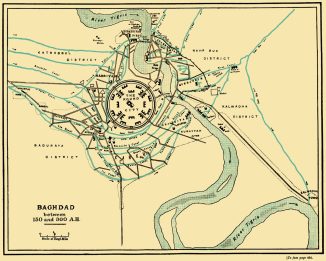
Notable scholars based in Baghdad during this time include translator Hunayn ibn Ishaq, mathematician al-Khwarizmi, and philosopher Al-Kindi. When the city was sacked by the Mongol Empire in the 13th century, the societal and cultural value of the city had become so great, its economic command so vast, that scholars today suggest that it was only this great blow that allowed the European Renaissance to take over the world, and that more amazingly, the sacking of Baghdad is something which even the recent Hussein regime was struggling to recover from. (762)
Happy 63rd Birthday to Laurence Fishburne, the producer and actor best known for playing the iconic resistance fighter Morpheus in The Matrix trilogy, offering Neo (Keanu Reeves) a red pill or a blue pill.
Born in Atlanta, Fishburne also starred in Boyz n the Hood (1991) and the John Wick film series, which is bringing him back as The Bowery King in John Wick 4—currently filming toward a release date of May, 2022.

For his portrayal of Ike Turner in What’s Love Got to Do With It (1993), Fishburne was nominated for an Academy Award for Best Actor. He won a Tony for Best Featured Actor in a Play, Two Trains Running, and won an Emmy for Outstanding Guest Actor for TriBeCa. He’s co-starred in dozens more films and TV shows, including the heartwarming Akeelah and the Bee, and he shows off his comedic chops in the currently-running ABC sitcom Black-ish.
He’s a big fan of Brazilian author Paulo Coelho and plans to produce a movie based on his novel The Alchemist. Fun Fact: He also played ‘Cowboy Curtis’ in Pee-Wee’s Playhouse… WATCH a recent interview where he compares his role in Contagion to the current pandemic, and talks about his new films, like Ice Road with Liam Neeson… (1961)
Happy 66th Birthday to Kate Bush, the pioneering English singer-songwriter, musician, dancer, and record producer, who became the first female artist to achieve a UK number-one hit with a self-written song in 1978 when, still a teen, she topped the chart for four weeks with her debut single, Wuthering Heights. She has since released 25 UK Top 40 singles, including the Top-10 hits Man with the Child in His Eyes, Babooshka, Running Up That Hill, Don’t Give Up (with Peter Gabriel) and King of the Mountain. Eclectic, experimental, and theatrical, after she announced her first concerts in 35 years, the 22 shows sold out in a record 15 minutes.

Having released ten studio albums in five decades, (three at No. 1, including Hounds of Love), she was the first British solo female artist to top the UK album charts, and the first female artist to enter the album chart at number one. With the hype over the new London shows in 2014, she had eight albums in the UK Top 40 Albums Chart simultaneously, placing her third behind Elvis Presley (with 12 albums in 1977), and The Beatles (in 2009 with 11). A 3-disk live recording from the shows is called Before the Dawn. She was inducted into the Rock and Roll Hall of Fame in 2018, and was appointed Commander of the Order of the British Empire (CBE) for honors in the service to music… HEAR about her remarkable comeback, and WATCH her perform… (1958)
Also, on this day in 1619, in a church in Jamestown, Virginia, the first-ever representative government in the Americas convened for the first time to establish local law as “the House of Burgesses.”
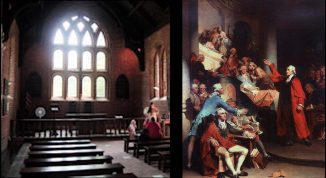
Governor George Yeardley, installed by royal charter, gathered 22 elected Burgesses, representing the 11 plantations and settlements in Virginia. King James I, who believed in the divine right of monarchs, attempted to later dissolve the assembly, but the Virginians continued to meet at least once a year with their royal governor to decide local laws and determine taxation. All the great powers in the world at that time—China, France, Rome, Japan, Russia–were all ruled by kings, czars, and emperors, but in Virginia a new precedent was being set—and four centuries later, their elected representatives are still deciding matters with a vote and pen, rather by sword or bloodline. Some of the Burgesses elected later became household names.
Significantly, the House of Burgesses decided, contrary to instructions, that their decisions would be immediately binding, rather than held in limbo for months until London had reviewed them. Each of the other 13 new English colonies in America followed suit, demanded their own legislatures and resisting London’s demands for more control. By the time of the Declaration of Independence, colonists had already a century and a half of practice in establishing democracy, and notable new members of the Virginia assembly—Patrick Henry, George Washington and Thomas Jefferson—would lead the charge to secure full independence from the British throne. The six-day debut of the legislative session was cut short due to an outbreak of malaria.
59 years ago today, President Lyndon Johnson signed two national health programs into law, so that family savings were no longer in jeopardy of being wiped out.
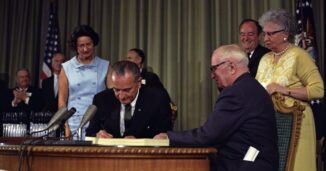
Medicare was important because, at that time, nearly half of all Americans over 65 had no health insurance. Medicaid has since provided coverage for some 68 million children, parents, pregnant mothers, and people with disabilities. (1965)
Happy 77th Birthday to Arnold Schwarzenegger, the actor, bodybuilder, and former 2-term governor of California who is now fighting to bring redistricting reform to the American political system. “Born in Austria and Made in America”, the ‘Governator’ became the youngest man ever to win the Mr. Universe contest at age 20, then pursued a film career, starring in in Conan the Barbarian, Predator, the Terminator series, and Total Recall.
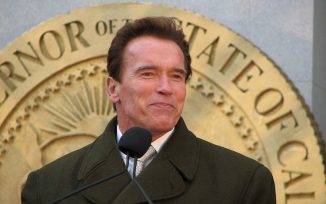
In 2006, Gov. Schwarzenegger signed the Global Warming Solutions Act, creating the nation’s first cap on greenhouse gas emissions, which targeted utilities, refineries, and manufacturing as part of a plan to reduce the state’s levels by 25 percent by 2020. In 2011, Schwarzenegger founded the R20 Regions of Climate Action to develop a sustainable, low carbon economy. In 2012, he helped to found the Schwarzenegger Institute for State and Global Policy at USC to boost bi-partisanship cooperation in finding solutions to the country’s most serious challenges. Beyond his well-known support for the Special Olympics, he founded the Inner City Games Foundation in 1995 to provide cultural, educational, and community enrichment programming to over 250,000 youth in 15 cities and 400 schools countrywide. (1947)
And, on this day in 1961, the Trans-Canada Highway officially opened, the longest national highway system in the world. The main route spans 7,476 km (4,645 mi) across the country, one of the longest routes of its type in the world. The highway system is recognizable by its distinctive white-on-green maple leaf route markers.

Unlike the US Interstate Highway System, there is no unified standard for the number of lanes or the type of roadways the TCH should be. In some cases, there are two lanes, in others four. In Quebec, the TCH overlaps with the province’s own Autoroute, while in many parts there are no good passing opportunities or bypasses.
The system was approved by the Trans-Canada Highway Act of 1949, with construction commencing in 1950. The highway officially opened in 1962, with the completion of the Rogers Pass section of highway between Golden and Revelstoke. This section of highway bypassed the original Big Bend Highway, the last remaining section of gravel highway on the route. Upon its original completion, the Trans-Canada Highway was the longest uninterrupted highway in the world.
Construction on other legs continued until 1971 when the last gap on Highway 16 was completed in the Upper Fraser Valley east of Prince George, at which point the highway network was considered complete.
SHARE the Milestones, Memories, Music, and Movies…
>read more at © GoodNews
Views: 1